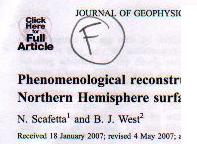I was honoured to be invited to the annual regional conference for Norwegian journalists, taking place annually in a small town called ‘Hell’ (Try Earth Google ‘Hell, Norway’). During this conference, I was asked to participate in a panel debate about the theme: ‘Climate – how should we [the media] deal with world’s most pressing issue?’ (my translation from Norwegian; by the way ‘Gods expedition’ means ‘Cargo shipment’ in ‘old’ Norwegian dialect).
Are Temperature Trends affected by Economic Activity (II)? ¿Están las tendencias de la temperatura del aire afectadas por la actividad económica?
Recently, I received multiple requests to discuss a paper, due to appear in Journal of Geophysical Research (JGR-atmosphere), that has been presented in the media just before the Bali conference and the Nobel Peace prize ceremony here in Oslo, Norway. The paper concludes that the warming measured over land is most likely exaggerated due to non-climatic effects, and it presents a regression analysis suggesting that the real (climatic) global mean temperature trend should be ~50% lower over land.
[Read more…] about Are Temperature Trends affected by Economic Activity (II)?
A phenomenological sequel

Does climate sensitivity depend on the cause of the change?
Can a response to a forcing wait and then bounce up after a period of inertness?
Does the existence of an 11-year time-scale prove the existence of solar forcing?
Why does the amplitude of the secular response drop when a long-term trend is added?
[Read more…] about A phenomenological sequel
Spanish perspectives

The majority of the presentations focused on the science, but aspects such as the utility and the benefit of meteorology and climatology were also discussed. A media session also provided some thoughts about outreach and presented some examples of how weather is presented on TV. While gender and educational issues were discussed, the underrepresentation of other minorities was neglected.
Cosmic rays don’t die so easily
 Last week, a Norwegian official-looking – and in my view – climatesceptic website praised Eigil Friis-Christensen from the Danish space center (featuring in the Great Global Warming Swindle) and hailed him for having given the best speech ever in the annual Birkeland seminar organized by Norwegian Academy of Science and Letters (NASL). There were rumours of controversy behind the scene before the seminar, as the NASL is regarded as a prestigious body in Norway.
Last week, a Norwegian official-looking – and in my view – climatesceptic website praised Eigil Friis-Christensen from the Danish space center (featuring in the Great Global Warming Swindle) and hailed him for having given the best speech ever in the annual Birkeland seminar organized by Norwegian Academy of Science and Letters (NASL). There were rumours of controversy behind the scene before the seminar, as the NASL is regarded as a prestigious body in Norway.
Furthermore, Svensmark and Friis-Christensen have written a response (title ‘Reply to Lockwood and Fröhlich – The persistent role of the Sun in climate forcing’; DNSC Scientific Report Series 3/2007) to a recent paper by Lockwood and Frohlich (LF2007). In this response, they state ’… [LF2007] argue that this historical link between the Sun and climate came to an end about 20 years ago‘. Another quote from their response is ‘Here we rebut their argument comprehensively’. So the cosmic ray theory isn’t quite dead after all?
Regional Climate Projections
Regional Climate Projections in the IPCC AR4
 How does anthropogenic global warming (AGW) affect me? The answer to this question will perhaps be one of the most relevant concerns in the future, and is discussed in chapter 11 of the IPCC assessment report 4 (AR4) working group 1 (WG1) (the chapter also has some supplementary material). The problem of obtaining regional information from GCMs is not trivial, and has been discussed in a previous post here at RC and the IPCC third assessment report (TAR) also provided a good background on this topic.
How does anthropogenic global warming (AGW) affect me? The answer to this question will perhaps be one of the most relevant concerns in the future, and is discussed in chapter 11 of the IPCC assessment report 4 (AR4) working group 1 (WG1) (the chapter also has some supplementary material). The problem of obtaining regional information from GCMs is not trivial, and has been discussed in a previous post here at RC and the IPCC third assessment report (TAR) also provided a good background on this topic.
The climate projections presented in the IPCC AR4 are from the latest set of coordinated GCM simulations, archived at the Program for Climate Model Diagnosis and Intercomparison (PCMDI). This is the most important new information that AR4 contains concerning the future projections. These climate model simulations (the multi-model data set, or just ‘MMD’) are often referred to as the AR4 simulations, but they are now officially being referred to as CMIP3.
One of the most challenging and uncertain aspects of present-day climate research is associated with the prediction of a regional response to a global forcing. Although the science of regional climate projections has progressed significantly since last IPCC report, slight displacement in circulation characteristics, systematic errors in energy/moisture transport, coarse representation of ocean currents/processes, crude parameterisation of sub-grid- and land surface processes, and overly simplified topography used in present-day climate models, make accurate and detailed analysis difficult.
I think that the authors of chapter 11 over-all have done a very thorough job, although there are a few points which I believe could be improved. Chapter 11 of the IPCC AR4 working group I (WGI) divides the world into different continents or types of regions (e.g. ‘Small islands’ and ‘Polar regions’), and then discusses these separately. It provides a nice overview of the key climate characteristics for each region. Each section also provides a short round up of the evaluations of the performance of the climate models, discussing their weaknesses in terms of reproducing regional and local climate characteristics.
Transparency of the IPCC process
Recently, a Financial Times op-ed criticised the IPCC for having contributors and peers drawn from a narrow professional circle. I don’t think this is fair, unless one regards a whole discipline as ‘narrow’. Furthermore, recent public disclosure of both comments and response suggests a different story to the allegations in the FT op-ed of ‘refusing to disclose data and methods’. The IPCC has no control over the independent publication, but the disclosure of the comments and response at least enhances the openness for the synthesis of the report.
Why global climate models do not give a realistic description of the local climate Por que os Modelos Climáticos Globais não Fornecem uma Descrição Realista do Clima Local
Global climate
 Global climate statistics, such as the global mean temperature, provide good indicators as to how our global climate varies (e.g. see here). However, most people are not directly affected by global climate statistics. They care about the local climate; the temperature, rainfall and wind where they are. When you look at the impacts of a climate change or specific adaptations to a climate change, you often need to know how a global warming will affect the local climate.
Global climate statistics, such as the global mean temperature, provide good indicators as to how our global climate varies (e.g. see here). However, most people are not directly affected by global climate statistics. They care about the local climate; the temperature, rainfall and wind where they are. When you look at the impacts of a climate change or specific adaptations to a climate change, you often need to know how a global warming will affect the local climate.
Yet, whereas the global climate models (GCMs) tend to describe the global climate statistics reasonably well, they do not provide a representative description of the local climate. Regional climate models (RCMs) do a better job at representing climate on a smaller scale, but their spatial resolution is still fairly coarse compared to how the local climate may vary spatially in regions with complex terrain. This fact is not a general flaw of climate models, but just the climate models’ limitation. I will try to explain why this is below.
Does a Global Temperature Exist?Existe uma temperature global?
Does a global temperature exist? This is the question asked in a recently published article in Journal of Non-Equilibrium Thermodynamics by Christopher Essex, Ross McKitrick, and Bjarne Andresen. The paper argues that the global mean temperature is not physical, and that there may be many other ways of computing a mean which will give different trends.
The common arithmetic mean is just an estimate that provides a measure of the centre value of a batch of measurements (centre of a cloud of data points, and can be written more formally as the integral of x f(x) dx. The whole paper is irrelevant in the context of a climate change because it missed a very central point. CO2 affects all surface temperatures on Earth, and in order to improve the signal-to-noise ratio, an ordinary arithmetic mean will enhance the common signal in all the measurements and suppress the internal variations which are spatially incoherent (e.g. not caused by CO2 or other external forcings). Thus the choice may not need a physical justification, but is part of a scientific test which enables us to get a clearer ‘yes’ or ‘no’. One could choose to look at the global mean sea level instead, which does have a physical meaning because it represents an estimate for the volume of the water in the oceans, but the choice is not crucial as long as the indicator used really responds to the conditions under investigation. And the global mean temperature is indeed a function of the temperature over the whole planetary surface.
[Read more…] about Does a Global Temperature Exist?
‘Cosmoclimatology’ – tired old arguments in new clothes ‘Cosmoclimatologia’ – argumentos velhos e ultrapassados em nova roupagem
 In a recent issue of the journal Astronomy and Geophysics (A&G), Henrik Svensmark coined a new term: ‘cosmoclimatology’ . I think ‘cosmoclimatology’ is a good and refreshing name for anything combining our cosmos with our climate. However, all other aspects of the article I found very disappointing. We have already covered most of these topics before, but the A&G articles provides us with some new aspects to discuss. Furthermore, Svensmark is the Director for Center for Sun-Climate Research, Danish National Space Center, and therefore influential. He is also the co-author of a recent book with Nigel Calder that received some attention. Furthermore, a laboratory experiment of his also managed to make some headlines. It seems that solar forcing is one of the sceptics’ last trenches in the debate about climate change. In my view the A&G paper therefore merits a comment as long as the same old and worn arguments resurface without discussing misgivings from the critics.
In a recent issue of the journal Astronomy and Geophysics (A&G), Henrik Svensmark coined a new term: ‘cosmoclimatology’ . I think ‘cosmoclimatology’ is a good and refreshing name for anything combining our cosmos with our climate. However, all other aspects of the article I found very disappointing. We have already covered most of these topics before, but the A&G articles provides us with some new aspects to discuss. Furthermore, Svensmark is the Director for Center for Sun-Climate Research, Danish National Space Center, and therefore influential. He is also the co-author of a recent book with Nigel Calder that received some attention. Furthermore, a laboratory experiment of his also managed to make some headlines. It seems that solar forcing is one of the sceptics’ last trenches in the debate about climate change. In my view the A&G paper therefore merits a comment as long as the same old and worn arguments resurface without discussing misgivings from the critics.